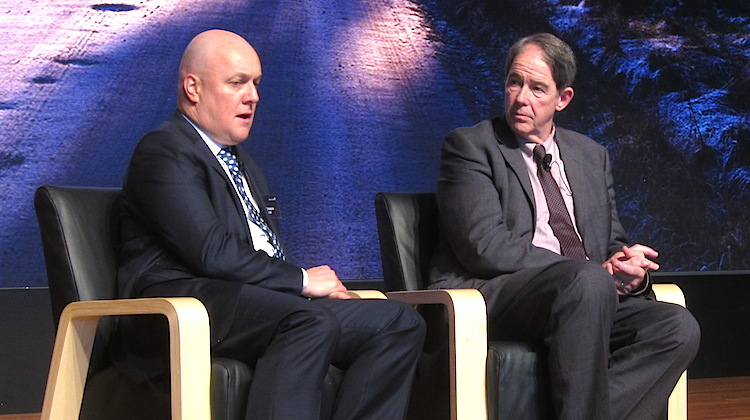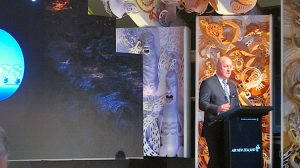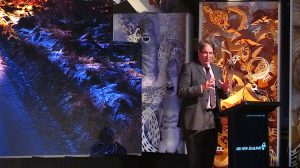
Air New Zealand chief executive Christopher Luxon says the airline’s focus on building sustainability into its everyday activities requires collaboration with other companies, government departments and the backing of its 11,000-strong staff.
The airline hosted a breakfast at Wellington’s Te Papa Museum on Wednesday, offered an update on its sustainability efforts six months after launching its sustainability framework at a similar event in Auckland.
Luxon told invited guests that since the Auckland launch, the airline has increased the recycling of in-flight waste, was making furniture underlay with old staff uniforms and will shortly switch its 75 ground vehicles to electric cars.
And in terms of the airline’s work beyond its own affairs and in the wider community, Luxon highlighted a joint biodiversity project with the New Zealand Department of Conservation (DOC) and Golden Bay’s Manawhenua ki Mohua iwi to restore native bird populations on the Abel Tasman great walk.
There is more heavy lifting to be done, however, keeping in mind the International Air Transport Association’s (IATA) sustainability targets, most notably carbon free growth by 2020 (ie offsetting the increase from carbon emissions from growth from 2020 onwards), and a cut to net emissions to half 2005 levels by 2050.

“We know that our sustainability framework sets out ambitious and very challenging targets,” Luxon said.
“We certainly don’t have it all figured out and are in any way perfect or have all the answers but we are wanting to make a huge effort and start that journey by learning by doing something.
“In the past six months we have seen that framework spurn a number of initiatives to help us improve our sustainability performance in the business.”
“Achieving a sustainable future will certainly take time and we may not even actually achieve it in all of our lifetimes but sustainability is a big issue and none of us can resolve it by ourselves.”
“The big takeaway is it is going to require massive amounts of interdependence, collaboration and new ways of working beyond our current practices.”
An Air NZ video posted in January 2016 highlighted the airline’s efforts with the Department of Conservation can be seen below:
https://www.youtube.com/watch?v=6zzl8wz6-fA
And the company also made a video of its move to use electric cars:
Highlighting the task ahead, Luxon noted the arrival of new fuel efficient aircraft such as the 787 Dreamliner has resulted in a 20 per cent improvement in fuel efficiency since 2006.
However, those gains did not keep pace with the growth the airline is expecting in the period ahead.
“While those gains are really good the big challenge for us at Air NZ and certainly aviation in general, the next five years our company will grow about 30 per cent we think as a minimum,” Luxon said.
“The problem is our emissions will grow 19 per cent.”
“So yes we have saved 11 per cent because we’ve gotten more fuel efficiency but we have a fundamental problem about how do we now still move forward and attack that other 19 per cent when we don’t have a lot of technology gains to come into the sector in the next 20 years and when we don’t fundamentally have any alternative fuels sitting out there that are obvious to us.”

Environmentalist and Forum for the Future co-founder Sir Jonathon Porritt, is one of six independent experts on Air NZ’s sustainability advisory panel alongside University of Auckland academic and writer Dame Anne Salmond; New Zealand entrepreneur and conservationist Rob Fenwick; social entrepreneur Derek Handley; US biofuels expert Suzanne Hunt; and International Air Transport Association (IATA) chief economist Brian Pearce. Luxon and the airline’s chief flight operations and safety officer Captain David Morgan also sit on the panel.
Porritt expressed disappointment that aviation and shipping were excluded from the agreement that emerged from the Paris climate change talks in December 2015.
“From the perspective of long-term planning for climate change, this is not smart,” Porritt said.
“And those of us who have been campaigning in this space for a very long time are tired of the exemptions that have been given to aviation and shipping to pursue their own destiny at their own speed through their own laborious procrastinatory processes in a way that really does cause a huge problem.
“It would be tempting for any individual airline to look at the, let’s call it, institutionalised mediocrity in the industry as a whole and decide to play it long, play it low-key, just be a couple of steps ahead of the lowest common denominator.”
Porritt congratulated Air NZ for taking the challenge head on.
“There are many airlines all around the world working out that exact little increment over and above the lowest common denominator.
“Happily, not Air New Zealand and I say happily because we need some real leadership in this space, almost more than any other sector today.”




